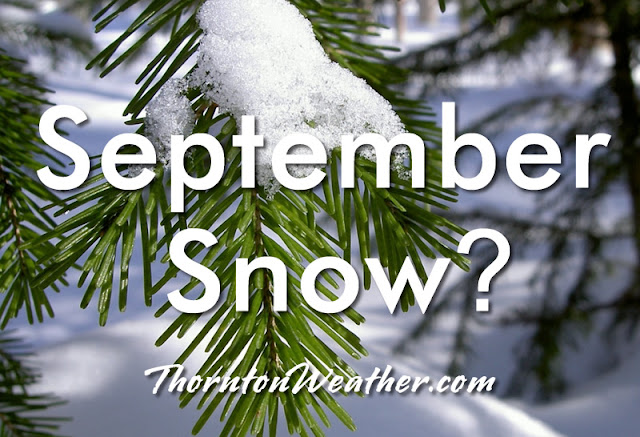
With a significant blast of cold air set to arrive this week, there is a chance for the Mile High City to see its first snowfall of the season. While such an event would be the first September snow of this millennium, it would hardly be unusual.
Looking back at Denver’s snowfall records dating to 1882, 45 Septembers have recorded a trace or more of snowfall. That means that out of 132 Septembers including this one, roughly one third of them have seen snow. Overall, the month averages 1.1 inches.
Of those 45 Septembers with snow, 17 were for only a trace. Twenty eight, or roughly 21 percent, had measurable snowfall of 0.1” or more.
Denver’s heaviest 24 hour September snowfall came between September 24 and 25 in 1936 when a hefty 15.0 inches fell to the ground. That snowfall contributed to 1936 taking its place as the second snowiest September on record.
For the entire month of September, some years saw rather significant totals. The top 10 September snowfall totals include:
17.2 inches in 1971
16.5 inches in 1936
12.9 inches in 1959
11.4 inches in 1895
8.7 inches in 1985
7.4 inches in 1995
6.5 inches in 1908
5.8 inches in 1961
5.5 inches in 1965
5.4 inches in 1993
The earliest snowfall on record occurred on September 3, 1961. On that date 4 inches of snowfall fell at the old Stapleton International Airport and the mercury dropped to a low of 33 degrees.
The last time Denver saw a September snow was on September 23, 2000 when 0.2 inches was recorded.
On average, we receive our first snow on October 19 so should snow fall, it will be well ahead of normal.
The cold that looks to come could very well bring an end to the growing season. The Mile High City’s first frost on average comes on September 20th followed by the average first freeze on October 7. Given that, a frost at the current time of the month is not that far off the mark. It does not appear at this moment we will see that first freeze – yet – but a frost is possible.
Will September 2014 break the 13 year streak with no September snow? Standby and check our forecast for the latest.
